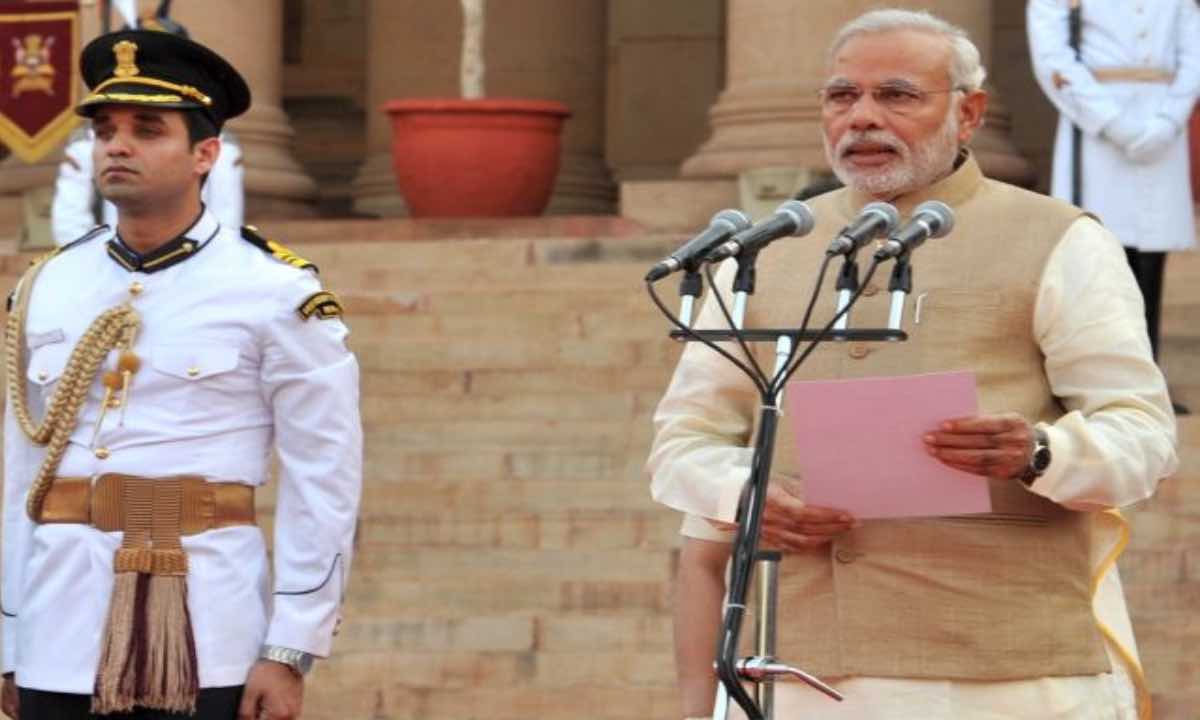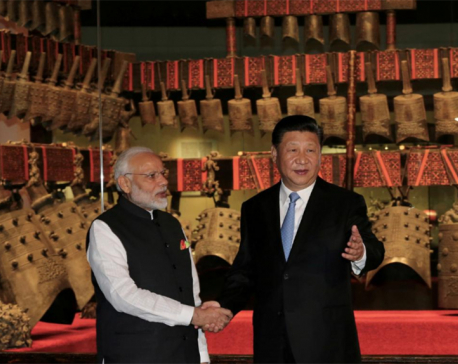
OR
#OPINION
On PM Modi’s ceremonial procedures of coronation and oath ceremony
Published On: June 9, 2024 08:55 AM NPT By: Nandan Prasad Adhikari

Once the proper proceedings of coronation purify and empower the ruler from all around, he attains the dazzling national dignity.
After the landslide victory of the National Democratic Alliance led by the Bharatiya Janata Party in the recently held General Elections of India, the incumbent Prime Minister Shri Narendra Damodardas Modi is all set to lead the government for a third consecutive term with a hat trick majority, a feat that had not been achieved after Prime Minister Pandit Jawaharalal Nehru. Shri Narendra Modi, who served as the 14th Prime Minister of India since May 2014 has been able to secure a coalition majority in terms of the number of seats in the Lok Sabha with absolute percentage of votes. The present article is dedicated to ceremonial procedures of auspicious coronation and oath taking ceremony based on the ancient Hindu philosophy as per sacred Sanatan rituals.
As per the laws of the land, a swearing-in ceremony is an oath taking or an affirmation of commitment before assuming the duties and exercising the powers of the office, which may be administered at an inauguration, enthronement and coronation during a public ceremony. The expression of 'coronation' is nowadays often used to refer to the election of a new party leader by acclamation without any votes. For the same, the very word 'coronation' in republics is widely used to refer to any formally and nationally celebrated ceremony in relation to accession of the Head of the State and/or the Head of the Government. In this article, the meaning of 'coronation' may be justified and referred to as per the Elected Government in waiting.
This article is mainly based on "Ceremonial Procedures of Auspicious Coronation: Affirmation of Nationhood and Divinity in the Royal Person" by late Prof. Ambika Prasad Adhikari, the former Right Hon'ble Badagurujyu of the then Kingdom of Nepal with the hope that it may inspire political leaders in general and the ruler in particular towards fulfilling the Rajdharma, the essence of good governance.
The auspicious ceremony of oath taking is in fact a great ceremony for the nation, also as the reflection of the supreme obligation of the ruler towards his fellow citizens. Without the people there can be no ruler, without the ruler the people cannot organize themselves, masses look up at the ruler, the ruler abides by the needs of his people. No state exists without people, nor can a nation function without the ruler. The ruler, the people and the nation - these three complement each other - the one requires the others, the absence of one nullifies the others.
Hindu scripture affirms the belief: If a nation is to sustain and prosper, its prime obligation is to solemnize the coronation of its ruler. Humans constantly toil in trying to fulfill their roles such as husband, wife, children, grandchildren in terms of land, property, prayers and worship, liberation from birth/death cycles and many other things. For all, the first and the greatest of needs is – the ceremonial oath taking of the ruler that must also secure the protection of the ruler thereafter, secure the safety of family and property. Just as an individual needs the guardianship of a nation to acquire what he values, to preserve what he has obtained, to promote his resources, to make most of what he has, the nation too needs a ruler to ensure all these protective covers. Not surprisingly, our farsighted forefathers have taught us - it is the supreme and the very first obligation of a nation to organize the coronation of its ruler in as grand a manner as possible.
At present, the citizens of Bharat are engaged in fulfilling this very great and supreme obligation. The very bright light of human culture being refined from the dawn of civilization is growing strong. The righteous path of Dharma that laid the foundation of human social structure and the institution of sovereignty that emerged as the protector of this Dharma since the days of chanting of the Vedic hymns, the same path of Dharma and the ruler continue uninterrupted, unimpaired and purified form in Bharat, remain widely honored and glorified. Anyone looking for a Dharma and the ruler refined over the ages that eschew discrimination based on communalism, provincialism, outlandish thoughts, intoxicating beliefs, inducements of catechisms, that emphasize pure human aspirations and desire should focus on Bharat, the Hinduism practiced in Bharat and the First Lord of the Treasury of Bharat; the oath taking ceremony of the Head of the Government can provide an ideal example of such experience.
In this context, the auspicious oath taking ceremony of beloved Prime Minister Narendra Modi is undoubtedly the greatest ceremony of national significance for Bharat; this has also become a major event for the rest of the world. There will be official authoritative proclamations to explain and enumerate the significance, meaning and relevance of the diverse aspects of the auspicious coronation; my endeavor here is to throw light on the procedures of the rite of coronation and explain the meaning of ideals reflected in those procedures as a mark of my devotion to the ruler and the nation, even though my comments draw on my limited erudition and circumscribed learning.
The procedures of coronation are conducted according to the processes prescribed and refined as per observations of the Vedas, the holy Puranas, the Upanishads, the Brahamins and the Dharmasastras. There are numerous proceedings and ceremonial rituals under this great event. In summary form, three of the following can be pointed out as significant procedures: (1) Ceremonial bath, (2) Coronation (Abhisheka) and (3) Ascending the throne.
The ceremonial bath is a symbolic process of purifying the body removing the dirt accumulated in and outside the body. It is meant to cleanse the outer body and inner feeling. At the time of coronation, the ceremonial bath prepares the royal person worthy of the coronation ceremony. The ceremonial bath of coronation comprises two elements Marattikasnana (mud-bath) and Jalasnana (ablution). The Mrittikasnan involves applying the mud paste on royal bodies made of soil collected from many holy places. The Jalasnana involves ablution of the ruler mixing holy water collected from far and wide.
The Abhisheka is a process of creating a high distinction and exquisite standing through removing ill omen and bringing in all the blessings. During the coronation, Abhisheka constitutes the central core of the ceremony. A lot of preparation goes into finalizing Abhisheka. Various pitchers of clay, gold, silver, copper and wooden make are filled with sample of water from far and wide, from all oceans, seas, rivers and streams, lakes and ponds; they are mixed with different kinds of fruits, flowers, leaves, herbs, seeds, medicinal drops, perfumes and valuable stones and jewels. With these waters, the ruler receives Abhisheka from revered priests and gurus, kins and cousins, ministers, officials, scholars, artists, businessmen, artisans, and housewives from all castes, religions and backgrounds. The ruler offers worship for gods and deities and priests and gurus. The ruler then receives a crown of gold plate with carvings of Vishnu in Shrivatsa costume, Ganesha, Kumara, elephant, cow and the Bel-tree; the ruler thus is honored by priests and gurus with madhupark (an offering of honey, curds, ghee, white sugar and water) at the ceremonial chamber.
The Abhisheka ceremony is followed by actual ascension to the oath taking ceremony. For this, officials stand by at the appointed positions holding the royal insignia. Kins, courtiers, ministers and senior army personnel stand in honor holding white umbrellas, white yak hair fans, royal standard, festoons and the latest weapons while songs of praise for the ruler are sung, mantras are chanted and ceremonial music is played out with great fanfare. Amidst such great pomp and ceremony the ruler ascends the throne. The royal throne is bedecked with layers of red bull, wild cat, cheetah, lion and tiger skins (because the royal throne, a seat of honor, is known as 'Simhasana,’ some people say the lion skin should be placed over the tiger skin, but on the strength of - as seated on the pelt of the tiger - it is authoritative and proper to put tiger skin on top). With great fanfare and joyous chants, the ruler is led to the throne and a golden scepter is placed on his hand. Then the formal greetings, saluting, applause, benediction and blessings are offered to the ruler among others by foreign dignitaries, ambassadors and diplomats. This is a quick glimpse of the main religious ceremony.
We can see the important significance and meanings of all the three procedures just discussed concerning coronation. The ceremonial bath purifies the royal body, the Abhisheka fills up the ruler with great distinction and the ascension to the throne imparts the ruler with the power to use force and makes him fully responsible for the safety and prosperity of the nation.
The body made of semen and nurtured in the womb carries potential impurities associated with semen and womb; after birth too the body might have been tainted variously. Moreover, the body represents the food and nourishment of a particular region. The body cannot escape internal and external colorings of sense organs, mind and intelligence related to gender, caste, color, family ties giving the same arrogance and personal preferences. The ceremonial bath involving holy waters in addition to purifying the body born of the mother's womb also transforms the body as born of the nation's womb into the royal personage.
The ruler does not merely belong to one particular place; he ought to comprise the soil and water of the whole nation. The ruler ought to be seen as present in the soil and water of the country. The ruler must stand for every particle of the nation’s soil and water; these particles must be imbued with soulful national consciousness; they should be awakened as well as activated. This is the sense and significance of the ceremonial bath of coronation. Once this ceremonial bath is completed the ruler’s body assumes the nation’s body.
Now on, it ceases to be particularized, nor does it carry the trait of arrogance or narrow interest of gender, caste, color, family ties and kinship. It assumes an all covering form and it represents all genders, castes, colors, enjoying equal relations with all, and it is rightly so. The ruler belongs to all. This institution ought not to work under the influence of personal favor or dislike, it has to look for right and wrong; it has to shun the guilty no matter how close it may be and it has to favor the worthy no matter how remote it may be. Thus is the royal personage prepared for Abhisheka through ceremonial bath amidst the chanting of mantras derived from the vision of sages who led the life of truth, mediation and purity.
The Abhisheka bestows the royal persona, the nation’s body with the entire strength of the nation and its divine touch. In other words, the Abhisheka is the process of imparting the royal body with all the nation’s strength and divine touch from all around. The ceremony of Abhisheka bestows upon the ruler all the powers of elements - the earth, water, fire, air, space from the entire nation. The ruler becomes endowed with the strength of fruits and flowers, herbs, seeds, seedlings, trees, plants, vines, jewels, metals, medicines and every important objects found in the nation. The ruler thus assumes the grave responsibility of overseeing the production, preservation and utilization of all their objects.
The ruler has to be present everywhere; the ruler is in charge of all creations and conditions. In this way, the entire strength of the nation is represented in the ruler, and the ruler is imbued with divine power. For the people, such a ruler becomes like God. However, for his own person, such a ruler becomes a mere representative of God, a medium, a working hand. He is on the one hand responsible to the reposed power of the people's and on the other to the all pervasive presence of divine power. He has to act as God to his people and he has to serve God as a committed devotee. On both these fronts he is constantly guided by Dharma. His primary obligation is to uphold, to promote, to preserve and strengthen Dharma and then he would work to protect good people, punish the evil, develop the nation, secure national interest and keep the people happy.
The ruler receives Abhisheka from representatives of diverse caste, color and gender comprising the nation. The procedures of coronation amply testifies that whatever caste and sectarian divisions persist in the nation, they are all viewed to conform into a single national formation and unity from national perspective. A Shudra would also join others with the same privilege in offering Abhisheka to the ruler. The ruler represents a symbol of unity and national integration. All the essence due to a Brahmin, Kshatriya, Vaishya, Shudra, maleness and femaleness merge in the ruler. The nation is a composite form of all. This symbolizes the nation. All join combined forces of their knowledge, intelligence, skills and strength to create the nation’s power. Thus the neutral power born of collaborative goodwill assumes touch of divinity.
Moreover, to sanctify divinity in the ruler, a gold plate and crown is put on the ruler. The ruler who receives Abhisheka on the head, who is decked with gold plate, who wears the crown, who is offered holy water, milk, ghee and other auspicious substances by the Brahmins who are well-versed in the Vedas and scripture assumes the position of lord Vishnu, the living god in the land. Thereupon the ruler is entitled to use all his kins, courtiers, gurus, priests, ministers, officials, justices, army personnel, scholars, artists and artisans along with all the learning, strength and resources of the country to perform his responsibilities; they all present themselves for the service of the country and the ruler. In this general ambience, prayers and praise of the ruler are chanted all around. In this way, the Abhisheka procedure of coronation bestows the ruler with all powers encompassing elements, divinity and spiritual realms and thereby making the ruler a composite symbol of all transcendent power.
When the ruler is thus consecrated as the symbol of the nation and divinity, he is then led to ascend the throne. This procedure empowers the ruler to exercise the authority he has been presented through Abhisheka ceremony as he received the scepter and weapons signifying state power. The seat of the throne has the skin of five animals namely bull, wild cat, cheetah, lion and tiger. All these represent the species of cruel, indomitable, resilient and strong nature. Keeping them in check is really tough, only great courage, agility and strength can do so.
The first significance of having the ruler sit upon their skin is that the ruler is guided by the ideal of courage, bravery and strength. Secondly, it shows the significance of the theory of the use of force which means the weapons and penal power must be used to suppress beastly and crooked elements of the state and to show the path of good conduct to common people. If the country is bedeviled by crooked elements, the ruler should lose no time to eliminate them following the coronation. The ruler should take on the crooked elements and tendency found in the country and exercise severe check, control, crushing upon them to which all the forces in the country will assist the ruler. The third significance suggests the ruler who holds the sceptre, the symbol of punishment, must exercise self-restraint and must undertake great caution against cruel and crooked tendencies emerging within himself. The ruler should oversee the governance of the state keeping in mind the lapses of all kinds that may rise from lechery, anger, greed, arrogance of power and grandeur.
The legendary King Prithu was thus addressed by Gods and sages: “Oh! King! You deliver just judgment to all without favor of who is dear or not dear to you; completely renounce sexual desire, anger, greed and arrogance; never let them overshadow your thoughts; always be guided by your obligation to uphold Dharma; punish, subdue directly anyone who strays away from Dharma and righteous conduct; vow to honor, preserve and promote constantly by thought, words and deeds the glory, the dignity, the intellectual resources of the nation.” Prithu is widely celebrated as the first consecrated king, from whom the earth received her Sanskrit name, Prithvi.
Once the proper proceedings of coronation purify and empower the ruler from all around, he attains the dazzling national dignity, he exudes the royal strength, he ascends the throne of ruler, and then he becomes honorable, ideal, praiseworthy and appreciable to all as a man of surpassing achievement, as a symbol of Dikpalas, the guardians of the directions, as a composite presence of all gods and as an incarnate of protector Narayana, the supreme being. Among others, Dikpalas are deities who rule the specific directions of space according to Hinduism, Jainism and Buddhism.
In the Hindu tradition, rulership symbolizes the composite unity of the entire nation; it stands for the supreme visible symbol of the public welfare wrought about through the combination of compassionate divine elements; and it is the Avatar of lord Vishnu manifested to protect the world. The Hindu thought dignifies it with total power, resources, inventive details and respect and at the same time charges it with magnificent obligations and responsibilities.
Ever since this concept of rulership was invented, it has been progressively refined and practiced uninterrupted in Bharat which remains an ever shining and brilliant ideal. We can see this ideal in its full glorious form in the ruler of Bharat. Bharat and the citizens of Bharat may happily enjoy his benign protection. Let the auspicious coronation and oath taking ceremony endow the Prime Minister Shri Narendra Modi, with all the power inherent in the nation, with divine power, with prospects of development and right judgment as specified in the scripture and also the power that accrues from good conduct and thought.
You May Like This
_20211008173931.jpg)
PM’s India visit called off
KATHMANDU, Jan 7: Prime Minister Sher Bahadur Deuba’s scheduled visit to India has been canceled. Deuba was invited to India... Read More...

India PM to host China's Xi for informal summit
NEW DELHI, May 29: Indian Prime Minister Narendra Modi will host Chinese President Xi Jinping this year for an informal... Read More...

May 26: 6 things to know by 6 PM today
Your daily dose of the missed important news of the day. ... Read More...






Just In
- NRB introduces cautiously flexible measures to address ongoing slowdown in various economic sectors
- Forced Covid-19 cremations: is it too late for redemption?
- NRB to provide collateral-free loans to foreign employment seekers
- NEB to publish Grade 12 results next week
- Body handover begins; Relatives remain dissatisfied with insurance, compensation amount
- NC defers its plan to join Koshi govt
- NRB to review microfinance loan interest rate
- 134 dead in floods and landslides since onset of monsoon this year












Leave A Comment